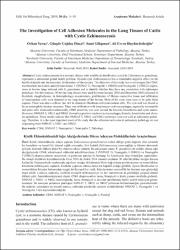The Investigation of Cell Adhesion Molecules in the Lung Tissues of Cattle with Cystic Echinococcosis
Citation
Yavuz, O., Dinçel, G. Ç., Gökpınar, S., Haydardedeoğlu, A. E. (2019). The Investigation of Cell Adhesion Molecules in the Lung Tissues of Cattle with Cystic Echinococcosis. Etlik Veteriner Mikrobiyoloji Dergisi, 30(1), 14 - 19.Abstract
Cystic echinococcosis is a zoonotic disease with worldwide distribution caused by Echinococcus granulosus, represents a substantial global health problem. Hydatid cyst (Echinococcus) has a remarkable negative effect on the health of people and the economic development of the country. The objective of this study was to investigate the CD68, nicotinamide nucleotide adenylyltransferase 3 (NMNAT 3), Neuregulin 1 (NRG1) and Neuregulin 2 (NRG2) expressions in bovine lungs infected with E. granulosus and to identify whether they have any correlation with pulmonary pathology. For this purpose, 30 bovine lung tissues were used between January 2016 and December 2016 collected in Kırıkkale slaughterhouse. In histopathologic examinations, proliferation of fibrous connective tissue and infiltration of mononuclear cells were detected in the lung tissues of the bovine. Most of the cysts were seen to be quite thick capsule. There was also a cellular line rich in abundant fibroblasts and mononuclear cells. The cyst wall was found to be an eosinophilic laminar structure. There was infiltration with lymphocytes and macrophages, especially eosinophils and giant cells. Immunohistochemically, CD68 positivity was seen around the bronchi, bronchioles and cystic matter. However; NMNAT 3, NRG1 and NRG2 showed no positive reactions in macrophages, bronchi, bronchioles and alveolar epithelium. These results indicate that NMNAT 3, NRG1 and NRG2 pathways were not used in pulmonary pathology. Therefore, it is the most important result of the study that the adhesion molecules in pulmonary pathology are not originating from NMNAT 3, NRG1 and NRG2. Kistik ekinokokkozis, dünya çapında Echinococcus granulosus’un neden olduğu geniş dağılımı olan zoonotik bir hastalıktır ve önemli bir küresel sağlık sorunudur. Kist hidatid (Echinococcus), insan sağlığı ve ülkenin ekonomik gelişimi üzerinde dikkate değer bir olumsuz etkiye sahiptir. Bu çalışmanın amacı E. granulosus ile enfekte olmuş sığır akciğerlerinde CD68, nikotinamid nükleotid adenililtransferaz 3 (NMNAT 3), Neuregulin 1 (NRG1) ve Neuregulin 2 (NRG2) ekspresyonlarını araştırmak ve pulmoner patoloji ile herhangi bir korelasyon olup olmadığını saptamaktır. Bu amaçla Kırıkkale kesimhanesinde Ocak 2016 ile Aralık 2016 arasında toplanan 30 adet büyükbaş akciğer dokusu kullanıldı. Histopatolojik incelemede, sığırların akciğer dokularında fibröz bağ dokusu proliferasyonu ve mononükleer hücrelerin infiltrasyonu saptandı. Kistlerin çoğunun oldukça kalın bir kapsülü olduğu görüldü. Ayrıca fibroblastlar ve mononüklear hücreler bakımından zengin bir hücresel hat vardı. Kist duvarının eozinofilik bir laminar yapı gösterdiği tespit edildi. Lenfosit, makrofaj, özellikle eozinofil infiltrasyonları ve dev hücrelerinin de görüldüğü yangısal alanlar dikkati çekti. İmmünhistokimyasal olarak, CD68 ekspresyonları bronş, bronşiyol ve kistik yapının etrafında gözlendi. NMNAT 3, NRG1 ve NRG2 makrofajlarda, bronş, bronşiyol ve alveolar epitellerinde hiçbir pozitif reaksiyon göstermemiştir. Bu sonuçlar, pulmoner patolojide NMNAT 3, NRG1 ve NRG2 yollarının kullanılmadığını göstermektedir. Bu nedenle, çalışmanın en önemli sonucu, pulmoner patolojide adezyon moleküllerinin NMNAT 3, Neuregulin 1 ve Neuregulin 2’den kaynaklanmadığıdır.
Source
Etlik Veteriner Mikrobiyoloji DergisiVolume
30Issue
1URI
https://app.trdizin.gov.tr/publication/paper/detail/TXpNeE1Ea3dNQT09https://hdl.handle.net/20.500.12587/1194
















